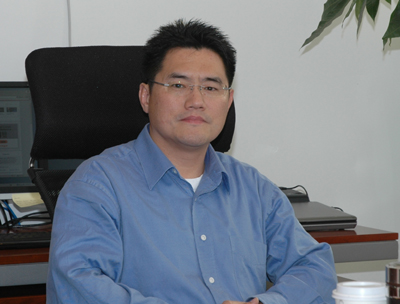 |
|
Dr. James Zhu
|
When we first met Dr. James Zhu, he had just returned to Beijing at midnight and had two teleconferences scheduled at 1:00 a.m and 4:00 a.m. Despite this, that morning he was still in high spirits.
Dr. James Zhu is currently a law partner in Perkins Coie’s Los Angeles Office, and the managing partner of Perkins Coie’s Beijing Office. James graduated from Fudan University and then went to America for overseas study. After a total of seven academic years, James obtained a Ph.D. degree in molecular and cellular biology from California Institute of Technology and a J.D. /MBA dual degree from Columbia University. James is now a registered patent attorney at the US Patent & Trademark Office, and is a member of the State Bar of California, the American Intellectual Property Law Association, and the Licensing Executive Society. James also sits on the Boards of the Chinese Biological Investigator Society (Wu-Ray Society, 2005-2007) and is the Chairman of BayHelix Group now. He has been actively involved with the Biotechnology Industry Organization (BIO) where he serves as a delegation committee member and promotes the presence of the Chinese delegation and pavilion in BIO. In 2008, he was selected as one of the “Most Influential ‘Sea Turtles’” (Chinese repatriates) in the life sciences industry of China and America by Business Week.
Studied overseas, but gave up his goal of earning a Nobel Prize
In 1986, James graduated from Fudan University, where he majored in biology. At that time in China, there was little information about overseas studies, but with great endeavor he entered California Institute of Technology in 1988 where he studied molecular and cellular biology. When he chose his majors at both Fudan University and California Institute of Technology, he had only one goal: to become a scientist and win a Nobel Prize. Many top Chinese scientists had previously graduated from California Institute of Technology, such as Qian Xuesen, Zhou Peiyuan, and Tan Jiazhen. So James dreamed of studying at this top university to become a top scientist who would be talented enough to contribute to China. Before going to California Institute of Technology, James stood in awe of the professors and masters there. His tutor was Elias Lazarides who tutored by James Watson, a giant in biology field. However, in the classroom, some professors often sat with students eating pizza, and drinking beer together while discussing the course subject matter. This kind of teaching method made James’ mysterious feeling toward these masters disappear and his thirst for becoming a scientist weakened. He said: “Sometimes, people are eager to catch mysterious things.” Maybe that’s the reason why he always explores new fields of study.
In 1991, when James’ tutor decided to work at Merck & Co, a pharmaceutical giant, he decided to go there together with his tutor. During this time, he worked during the day at Merck, and then worked at night to complete his dissertation until 1993, when he finally obtained his Ph.D. degree. At that time, there were few Chinese working at Merck & Co and James became one of the earliest Chinese researchers in Merck. At Merck, a researcher could live an easy life with a higher salary, which was considered the “American Dream” pursued by many overseas students. When talking about this period of his life, James said: “I could predict my future life and I could even see my aged years. It made me unhappy.” The easy life made him feel as if he lacked a challenge and he started to doubt his choice of biology as a career focus. In America, a senior middle school student or a college student always knew his interests clearly. However, at that time in China, when students chose their majors, they preferred to follow the science-oriented policies advocated by the government and believed that science would help to develop China in all aspects. Therefore, many overseas students studied science out of a sense of duty, while some students could not be sure of their own personal interests. James found himself in the same situation and, once in America, wanted to find a more challenging field of interest to him personally.
James noticed that the top students in America always chose to study medicine or law. But medicine would be too natural a choice and unchallenging to a biology major student; law, by contrast, would mean to start from scratch. So he chose this more challenging subject. Also, an incident at Merck prompted him to choose legal studies. James and his colleagues discovered a substance that had a similar function to paclitaxel, by inhibiting cancer cell growth by interfering with the normal microtubule breakdown during cell division. They asked Merck’s IPR department to file for a patent, but the patent lawyer told them the patent of this substance had been given to another company for anti-fungus use. Although their discovery was for a new use, they were told they would stand no chance to get a patent. It confused James. He thought they were two totally different things in the eyes of medicine. This incident reaffirmed James’ decision to plunge into the study of IPR and law.

